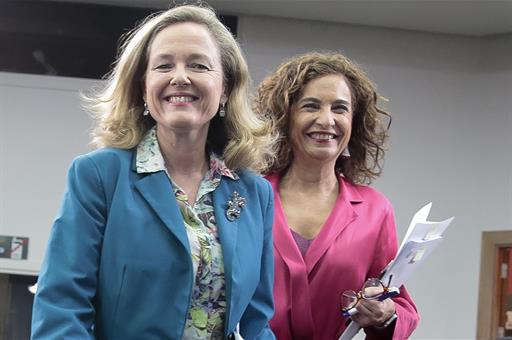Council of Ministers
Government agrees on path of budget stability and forecasts economic growth of 1.6% in 2020
Council of Ministers - 2020.2.11
Moncloa Palace, Madrid
The stability target for all tiers of government - Central Government, regional governments and local authorities - and for the social security system stands at 1.8% of the Gross Domestic Product (GDP) for this year, and the forecast for the next three years is for a reduction of 0.3% per annum to reach 0.9% of GDP by the year 2023.
The Government Spokesperson and Minister for the Treasury, María Jesús Montero, explained that the greatest effort will be made by Central Government, which must reduce its deficit by 0.8% this year, from the 1.32% recorded in 2018 to 0.5% in 2020. Regional governments must reduce their deficit by 0.1% to stand at 0.2% and the social security system by 0.3% to stand at 1.1%. Local authorities will continue with a deficit target of zero.
María Jesús Montero recalled that the Fiscal and Financial Policy Council approved these targets last Friday, which were also ratified on Monday by the National Commission for Local Authorities in relation to local councils and other local authorities.
As regards the public debt targets, the minister asserted that the forecast is to reduce them from 96%, the percentage that 2019 will foreseeably be closed at, to 89.8% by the year 2023.
In terms of the limit on the State's non-financial spending, or maximum ceiling on resources available for the budget year, the sum of 127.61 billion euros has been set for 2020, up 3.8% on the figure for 2019.
In turn, the rule on spending is set at 2.9% for 2020, and at 3%, 3.2% and 3.3%, respectively, for the following three years.
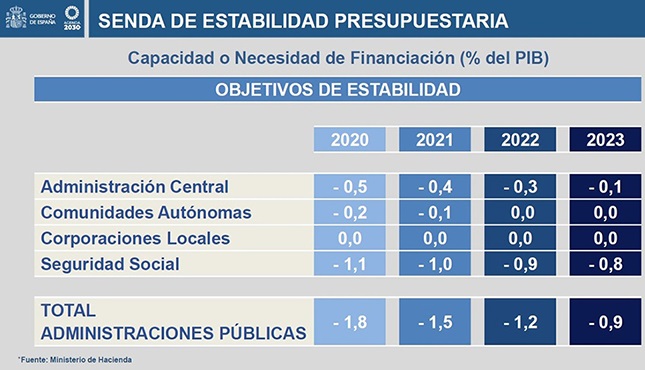
Approval by Lower House, preliminary step for 2020 National Budget
The minister argued that the targets are in line with the European Union's fiscal rules, they are realistic and they guarantee that Spain will continue to reduce its public deficit and debt at a rate "that does not harm growth or job creation".
María Jesús Montero expressed her confidence in the approval of this path of multiannual stability by the Lower House, which would help in the drafting and passage through Parliament of the National Budget for 2020.
The Minister for the Treasury considered that "to continue milking the current already extended Budget is no longer possible" given that "this prejudices citizens as a whole and holds back public investment".
María Jesús Montero advocated having new public accounts available as soon as possible that allow the pillars of the Welfare State to be improved and action to be taken on priority issues such as "the reduction of inequality, the defence of the interests of the middle class and working class, a just ecological transition, the digital challenge and the fight against poverty, particularly child poverty".
Prudent macro-economic chart
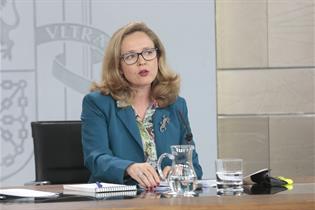 Pool Moncloa/JM CuadradoThe government estimates that the economy will grow by 1.6% in 2020 and will stabilise during the coming years against a volatile international backdrop.
Pool Moncloa/JM CuadradoThe government estimates that the economy will grow by 1.6% in 2020 and will stabilise during the coming years against a volatile international backdrop.
The Vice-President of the Government and Minister for Economic Affairs and Digital Transformation Nadia Calviño, argued that the forecasts contained in the macro-economic chart for the years 2020-2023 are prudent and in line with the forecasts of national and international bodies, which point to growth in Spain continuing above the European Union average in the coming years. "Our action is guided by the principle of prudence, responsibility and realism. This is the line we have followed and that has allowed us to regain the trust of investors in the Spanish economy", she said.
The document, explained Nadia Calviño, provides for the need to combine assertive growth with the sustainability of the public accounts. "Our goal is to reduce the public deficit and debt as soon as possible without endangering economic growth and job creation, in order for the debt ratio to the Gross Domestic Product to stand at below 90% by the end of the term of office", she added.
The Vice-President of the Government highlighted that the Spanish economy closed the year 2019 n a positive note, with average growth of 2%, according to the advance statistics published by the National Statistics Institute. She also stressed that this "is more robust and balanced growth than in previous expansive phases", as can be witnessed in the balance between internal and external demand".
At present, remarked Nadia Calviño, Spain is growing, unemployment is falling, there is a current account surplus and exports have maintained, and even gained, market share.
Improvement in employment
As regards employment, the Vice-President of the Government underlined that it has remained in line with the economic cycle and the dynamic nature of the job market during the fourth quarter of 2019, which has led to the year closing with nearly 20 million people in work, one million more than 10 years ago.
The government expects job creation to adjust to the trends of the Gross Domestic Product (GDP) in the coming years, with a reduction in the unemployment rate and an increase in the active population. In this regard, unemployment is expected to stand at 13.6% this year and fall to 12.3% by the year 2023.
391 million euros for medication
The government authorised the central procurement of medication for the sum of 391 million euros. This procedure allows for active ingredients to be purchased on a large scale, and hence, reduce costs.
María Jesús Montero explained that 10 regional governments have signed up to this agreement, together with the Healthcare Management Institute and the Ministry of Defence. "We thus contribute to strengthening the efficiency and cohesion of the National Health System".
Information and institutional coordination following Brexit
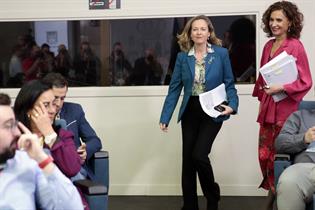 Pool Moncloa/JM CuadradoThe Council of Ministers analysed the periodic report drawn up on Brexit and agreed that the Minister for Foreign Affairs, European Union and Cooperation, Arancha González, should hold a round of meetings with the political groups to explain the situation following the withdrawal of the United Kingdom from the European Union, the contingency plans and the coordination measures planned with EU institutions.
Pool Moncloa/JM CuadradoThe Council of Ministers analysed the periodic report drawn up on Brexit and agreed that the Minister for Foreign Affairs, European Union and Cooperation, Arancha González, should hold a round of meetings with the political groups to explain the situation following the withdrawal of the United Kingdom from the European Union, the contingency plans and the coordination measures planned with EU institutions.
With the same goal, explained the Government Spokesperson, communication and collaboration will be stepped up with the regional governments through the Conference on Affairs Related to the European Union (Spanish acronym: CARUE), the body that structures their participation in those European affairs that affect them.
Other agreements
- Regional governments of Andalusia, Region of Valencia, Madrid, Navarre and Basque Country authorised to issue debt, promissory notes and formalise long-term loans, for the sum of 7.2 billion euros.
- Approval of report containing proposals to speed up and improve the process of transposing European Union Law to the Spanish legal system.
- Agreement between the Kingdom of Spain and the United Nations Educational Scientific and Cultural Organization (UNESCO) to continue hosting the International Centre for Mediterranean Biosphere Reserves in Castellet i la Gornal (Barcelona).
- Grand Cross of the Civil Order of Alfonso X the Wise granted posthumously to the film director and creator José Luis Cuerda Martínez.
Current affairs
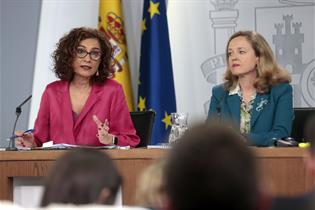 Pool Moncloa/JM CuadradoMaría Jesús Montero began the press briefing following the Council of Ministers by conveying the government's solidarity and affection to the families of the two women recently murdered by their partners in Granada and in Lugo, as well as its rejection of those who protect, justify or allow gender-based violence. "We need there to be no loopholes that allow gender-based violence or abuse to continue taking away lives in our country", she said.
Pool Moncloa/JM CuadradoMaría Jesús Montero began the press briefing following the Council of Ministers by conveying the government's solidarity and affection to the families of the two women recently murdered by their partners in Granada and in Lugo, as well as its rejection of those who protect, justify or allow gender-based violence. "We need there to be no loopholes that allow gender-based violence or abuse to continue taking away lives in our country", she said.
As regards coronavirus, the Government Spokesperson conveyed a message or prudence and of calm. The Ministry of Health, stressed María Jesús Montero, is providing frequent, transparent briefings and the healthcare system is "absolutely ready to tackle any kind of contingency". Our healthcare professionals, she added, have received "excellent training", are coordinating with the Ministry of Health and are aware of the protocols for action and preventive measures to apply, as the case may be.
In relation to the decision by some multinationals to not attend the Mobile World Congress technology event in Barcelona, for fear of the coronavirus, the minister passed on a message of confidence. "The organisation of the congress has stepped up security measures to prevent any kind of risk to those attending".
As regards the visit to Spain by the UN Special Rapporteur for extreme poverty and human rights, Philip Alston, who warned of the situation of the most vulnerable groups and of the economic difficulties of the middle classes, the Government Spokesperson reiterated that the government's commitment to these citizens remains firm and that it will work towards making inclusive economic growth compatible with social justice.
Non official translation





